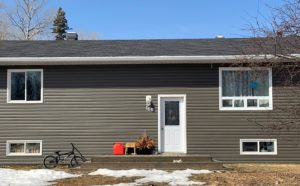‘Everyone is working together to try to combat this,’ says Red Rock Indian Band Chief

By Rick Garrick
RED ROCK INDIAN BAND — Red Rock Indian Band announced a State of Emergency and a Shelter in Place Order on Mar. 31 after the first confirmed coronavirus disease (COVID-19) case was identified in the neighbouring community of Nipigon.
“The Shelter in Place Order is a tool used by officials to keep people indoors,” says Red Rock Indian Band Chief Marcus Hardy. “It is usually used during or immediately after a natural disaster, but Chief and Council along with our emergency response team here at Red Rock Indian Band have modified it in response to stop spreading or to flatten the curve of COVID-19.”
The Northern Superior Region community, which is located about two kilometres away from Nipigon, across the Nipigon River Bridge, is also limiting access to the reserve and reducing hours at Lake Helen Gas and Variety. The Lake Helen Gas and Variety is now open from 12-6 p.m. on Tuesdays and Thursdays.
“We blocked five of our seven entrances off and we left one entrance open on either side,” Chief Hardy says. “We have signage in place to limit traffic to local and emergency services only. What we also did was limit our gas stations here on the reserve with their hours of operation and days of operation just to eliminate or diminish the exposure to COVID-19 in our community.”
Chief Hardy says there is “a lot of worry” in the community about the four confirmed COVID-19 cases that are now in Nipigon, as announced by the Thunder Bay District Health Unit on Apr. 3. The three latest cases are in the close contact exposure category.

“I’m very fortunate to have a good, supportive community behind us,” Chief Hardy says. “They are all cooperating and they are all concerned as well, so everyone is working together to try to combat this.”
Hardy says the Shelter in Place Order and the other measures are in effect for no less than four weeks beginning on April 1.
“At the end of these four weeks we are going to reassess and see where we are,” Hardy says. “If we have to put it in place longer, I am sure no one would have an issue with that — it’s keeping everyone safe and it’s keeping everything contained outside the community right now. I have a great council with me and we’re doing our best to keep everyone safe and kudos to the community and our [citizens] for doing everything they can to flatten the curve.”
Fort William First Nation also announced on Apr. 3 that a 24-hour security checkpoint would be set up beginning that day at 6 p.m. at the north end of Mission Rd. to restrict total access between 6 p.m.-6 a.m. with only emergency services to be allowed through the checkpoint.
The community is also restricting individuals who are not Fort William citizens to their places of employment or business between the hours of 6 a.m.-6 p.m. Non-citizens are not allowed to access the checkpoints without proof of residence or the express permission of Fort William First Nation.
The Thunder Bay District Health Unit had 18 confirmed COVID-19 cases as of Apr. 6, with 13 in Thunder Bay and surrounding areas, four in Nipigon and one in a remote First Nation, Eabametoong in Nishnawbe Aski Nation. The Thunder Bay District Health Unit has 23 First Nation communities in its region, including seven Northern Superior Region communities.

